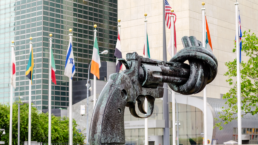The map of global participation in the sanctions against Russia suggests a new non-aligned movement might be on the rise.
By David Adler, The Guardian
On 2 March, as the number of Ukrainian refugees fleeing Russia’s brutal invasion reached 1 million, the United Nations security council called an emergency session of the general assembly. There, 193 nations reviewed a resolution on Russia’s “aggression against Ukraine” and voted overwhelmingly to approve it: 141 votes in favor, 35 abstentions and just five votes against. Even some of Russia’s closest allies on the continent – Serbia, for example, or Hungary – voted to condemn the invasion. “The message of the general assembly is loud and clear,” said the UN secretary-general, António Guterres.
What exactly is that message? In recent days, many commentators have pointed to a global map of the UN resolution to demonstrate the unity of the west and the world in taking on the Putin government. But to make sense of the geopolitical consequences of the Russian invasion, we must look beyond the diplomatic theater of the general assembly to examine how these nations are actually engaged with the war in this phase of rapid escalation. And to do that, we should start with a very different map of the world – a map of global participation in the sanctions set against Russia by the United States and its allies.

The contrast between these maps could not be more striking. The US, the UK, Canada, South Korea, Switzerland, Japan, Australia, New Zealand, Taiwan, Singapore, the EU: beyond this fortified coalition, very few nations have chosen to take part in the economic warfare set against the Putin government. On the contrary, many of the world’s largest nations – including China, India, Brazil, Bangladesh, Pakistan, Indonesia, and even Nato ally Turkey – have refused to join in. “We will not blindly follow the steps taken by another country,” said Indonesia’s foreign ministry representative at a recent press conference.
Recent Posts
“Arrest Now, Ask Questions Later”: Why Did L.A. ICE Agents Arrest and Jail U.S. Citizen Andrea Velez?
July 3, 2025
Take Action Now “They didn’t have vests that said ICE or anything. Their cars didn’t have license plates. … Just because of the color of our…
Trump’s Big, Beautiful Bill Is Naked Class War
July 3, 2025
Take Action Now Trump’s “Big, Beautiful Bill” trades tax cuts on millionaires for the dissolution of society.By Hamilton Nolan, In These Times…
Mayor Mamdani’s First Day, A Zero Hour Conversation With Richard Wolff
July 2, 2025
Take Action Now If elected, what would Mayor Mamdani do on his first day in City Hall? How would a democratic socialist govern as a big-city mayor?……
The U.S. Is Funding A Bloodbath At Gaza Aid Centers
July 2, 2025
Take Action Now The admin just gave $30M to GHF, the organization at the center of charges that Israel is weaponizing assistance and shooting at…




